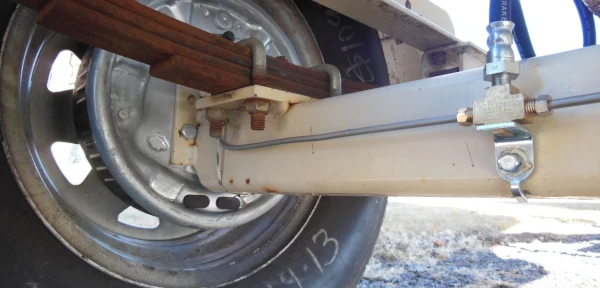 I have a McGregor sailboat on a trailer, and many years ago the brakes rusted out (salt water) and I had to have them taken out in order to move. The rest of the trailer is quite sound. I was informed by people in the industry that I could still tow the trailer as as the boat is quite light and my towing vehicle is quite heavy duty.
I have a McGregor sailboat on a trailer, and many years ago the brakes rusted out (salt water) and I had to have them taken out in order to move. The rest of the trailer is quite sound. I was informed by people in the industry that I could still tow the trailer as as the boat is quite light and my towing vehicle is quite heavy duty.
I tow my other boat trailers with no problems, and I have towed this trailer also with no problems for many years. Now a dealer (who wants to sell me brakes) tells me I am driving illegally.
Brakes it seems will cost me over $1000, and i only normally use the trailer twice per year - once in the spring to put the boat in the water, and once in the fall to take it out. This involves a drive of about one mile on a quiet road. A cost of $1000 seems excessive, and yet I do not want to do anything illegal.

I have raised this problem again with experts in the industry, who again assure me that I have nothing to worry about, and in fact have no compunction about using my truck and trailer to tow my boat to to a shipyard for servicing themselves.
I have checked with the RCMP, who have been very helpful and co-operative, but basically do not know. They pointed out that the rules seem to be different in every province and state anyway.
I asked our local GM dealer (my truck is a 3/4 ton full size 4 wheel drive built for towing) but they did not know either, and again told me the rules are different everywhere anyway.
I tried to reach the Department of Transport, with little or no success, and someone suggested that I tow the boat to a weigh scale for testing, which might be an illegal act, and then how would I get home? It is very confusing.
The best I can come up with is to use one of your regulations which says I may tow my boat without extra brakes providing what I am towing is less than 70% of the GVW of the towing vehicle. I have looked up the specifications and done the calculation and I get a result of 38%, so I should be alright.
In view of all the confusion I would like some confirmation from you please.
Trailer Brake Requirements in BC
I can tell you about trailer brake requirements in BC. This applies to all trailers, not just boat trailers:
The first thing that you need to do is know the total weight involved for the boat (and everything in it) and boat trailer (and everything carried on it) when you are ready to tow it. There are three divisions, total weight of 1,400 kg or less, over 1,400 kg but less than or equal to 2,800 kg and over 2,800 kg.
Trailer Weighs 1,400 Kg or Less
If your trailer and load weigh 1,400 kg or less, it only requires brakes if that weight is 50% or more of the licensed weight of the tow vehicle:
Trailer brakes
5.02 (3) A trailer shall be equipped with brakes at each end of each axle, but brakes are not required
(b) on any axle of a trailer other than a towing dolly if the licensed vehicle weight of the trailer
(i) is 1 400 kg or less, and
(ii) is less than 50% of the licensed vehicle weight of the vehicle by which it is being towed,
The licensed weight is commonly called the curb weight or what the manufacturer says that the vehicle weighed when it was first built.
Trailer Weighs More Than 1,400 Kg
If your trailer weights more than 1,400 kg it must be equipped with brakes:
Brakes required on all wheels
6.06 (1) Every bus, truck, truck tractor and commercial trailer shall be equipped with a service brake on each wheel.
Definition of Commercial Trailer
Don't let that word "commercial" confuse you. If your trailer weights more than 1,400 kg, it is a commercial trailer by definition regardless of what you might think.
"commercial trailer" means a trailer, or semitrailer, or house trailer, with a gross weight of more than 1 400 kg, but does not include a towed motor vehicle that weighs less than 2 000 kg and is less than 40% of the gross vehicle weight rating of a motor home towing it via a tow bar;
Breakaway Brake Required
You must also have a breakaway braking device:
Breakaway and emergency braking
6.07 (1) The service brakes with which a commercial trailer is equipped shall be of such manufacture and design and so installed and maintained that they will be applied automatically upon the separation of the commercial trailer from the vehicle by which it is being towed, and so that after such automatic application they will remain fully applied for not less than 15 minutes.
Trailer Weighs More Than 2,800 Kg
Finally, if the trailer weights more than 2,800 kg it must be equipped with brakes in the same manner as the over 1,400 to 2,800 kg category and those brakes must be able to be operated separately from the tow vehicle brakes by the driver:
5.02 (4) Brakes with which a trailer is equipped shall
(c) where the licensed vehicle weight of the trailer exceeds 2 800 kg, be capable of being applied by the driver of the motor vehicle towing the trailer from his normal seated position.
Surge Brakes
This essentially means that a surge brake is not acceptable for loaded trailers whose weight is over 2,800 kg.
Learn More
Share This Article
The only variable there would be if there is any incline to access the scale. If there’s no trailer brakes, the axle weight on the back axle will be incorrect, if you are on the scale, brakes on, prevent the trailer from rolling back.
Provincial scales are always dead flat.
- Log in to post comments
If I were to weigh my vehicle by placing the front axle on the scale, recording the weight, then placing the rear axle on the scale, recording the weight, then adding the two weights would the result be the true weight of my vehicle? Would it be the same weight if I were to measure my vehicle's weight on a "whole vehicle" scale - both axles at the same time?
- Log in to post comments
This is exactly the method that scale personnel use to weigh long commercial vehicles. It works for this situation too.
- Log in to post comments
- Log in to post comments

Weighing axles separately